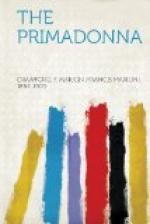Lady Maud was not gifted with much power of writing, for she was not clever at books, or with pen and ink, but she wrote her letter with deep conviction and striking clearness. The only point of any importance which she did not mention was that Logotheti had promised to help her, and she did not write of that because she was not really sure that he could do anything, though she was convinced that he would try. She was very anxious. She was horrified when she thought of what might happen if nothing were done. She entreated Van Torp to answer that he would take steps to defend himself; and that, if possible, he would come to town so that they might consult together.
She finished her letter and went to bed; but her good nerves failed her for once, and it was a long time before she could get to sleep. It was absurd, of course, but she remembered every case she had ever heard of in which innocent men had been convicted of crimes they had not committed and had suffered for them; and in a hideous instant, between waking and dozing, she saw Rufus Van Torp hanged before her eyes.
The impression was so awful that she started from her pillow with a cry and turned up the electric lamp. It was not till the light flooded the room that the image quite faded away and she could let her head rest on the pillow again, and even then her heart was beating violently, as it had only beaten once in her life before that night.
CHAPTER XVI
Sir Jasper Threlfall did not know how long it would be before Mr. Feist could safely be discharged from the establishment in which Logotheti had so kindly placed him. Dr. Bream said ’it was as bad a case of chronic alcoholism as he often saw.’ What has grammar to do with the treatment of the nerves? Mr. Feist said he did not want to be cured of chronic alcoholism, and demanded that he should be let out at once. Dr. Bream answered that it was against his principles to discharge a patient half cured. Mr. Feist retorted that it was a violation of personal liberty to cure a man against his will. The physician smiled kindly at a view he heard expressed every day, and which the law shared, though it might not be very ready to support it. Physically, Mr. Feist was afraid of Dr. Bream, who had played football for Guy’s Hospital and had the complexion of a healthy baby and a quiet eye. So the patient changed his tone, and whined for something to calm his agitated nerves. One teaspoonful of whisky was all he begged for, and he promised not to ask for it to-morrow if he might have it to-day. The doctor was obdurate about spirits, but felt his pulse, examined the pupils of his eyes, and promised him a calming hypodermic in an hour. It was too soon after breakfast, he said. Mr. Feist only once attempted to use violence, and then two large men came into the room, as quiet and healthy as the doctor himself, and gently but firmly put him to bed, tucking him up in such an extraordinary way that he found it quite impossible to move or to get his hands out; and Dr. Bream, smiling with exasperating calm, stuck a needle into his shoulder, after which he presently fell asleep.




